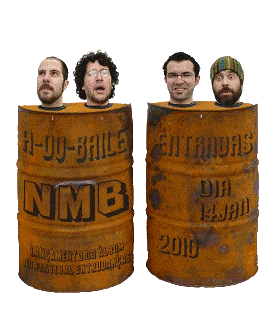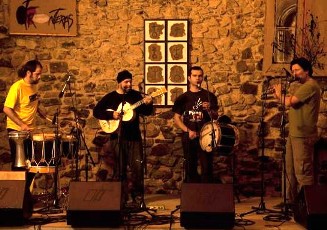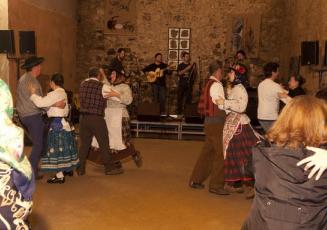
NMB @ FolkWorld: FW#42
FolkWorld Issue 43 11/2010; Article by Eelco Schilder
No Mazurka, No Fado
The Portuguese Roots of No Mazurka Band
The No Mazurka band (NMB) impressed me with their nice debut album, 'A do Baile'. Unfortunately their webpage was in Portuguese, so it was hard to get any information about the band. Reason enough to contact them and ask about their music, the mazurka and the fact that most people think Portuguese traditional music is Fado only.
The fact that it’s the first time I heard from these four musicians, I asked them to introduce themselves. They took their time and talked freely about their musical past and present.
António Bexiga: The four of us have pretty different musical paths and happen to live in four different areas of Portugal. My main instrument in NMB is the Viola Campaniça, a five double course steel string guitar used in Portuguese traditional music, mainly at the southern regions of Alentejo.
My early musical path had nothing to do with traditional music, as I think it happened with most people of my generation. For me, traditional music represented "the old world" - before the Portuguese carnation revolution in 1974 -, a world that I only knew about from the old people close to me, from books, cinema and media (I was born in 1976). Traditional music was not "sexy".
My connection with traditional music took place, mostly, at family reunions in late hours and some other periodic celebrations that I happened to attend to. After my first music lessons with my mother, I attended the conservatory to study piano; later, classical guitar and, after that, I also had a short term experience at a Jazz School.
 NMB @ FolkWorld: FW#42 |
Diogo Leal: As António says, the four of us have pretty different musical paths. In relation to me, I started playing music in 2000, the same year that I attended the faculty of fine arts. I have never thought before of learning music, but suddenly I became really interested in playing bagpipes. In my youth, I listened mostly to rock and heavy metal bands, one of these bands, had a song with a bagpipe and it really caught my attention. A bit afterwards I saw a concert of the Portuguese group Gaiteiros de Lisboa and I became really astonished with the instrument. A few time after I knew that I could start to learn it in the House of Galicia in Lisbon. This is how my interest for playing music started.
So I attended the bagpipe classes for three years, through which I became more and more interested in the Portuguese bagpipes tradition (which is quite rich and diverse). So while I made the studies in Fine Arts I continued to learn, and play bagpipes, a bit afterwards I started to learn to play pipes and tabor, which is also a traditional instrument in some parts of Portugal. Besides the classes of bagpipes in the House of Galicia, I attended small courses in Galicia and Zamora and some private classes of musical training.
About my family relation with music, I think I am the only one playing music, I just remember a brother of my grandfather, Joaquim Roque, which made some vinyl recordings of Alentejo's song groups in the 40's, and also wrote some books about the traditions of his hometown, Peroguarda. I have been a teacher of Galician bagpipes in Escola de Artes de Sines, in Alentejo Coast, South of Portugal, and also of pipe and tabor in the Association of Bagpipes in Lisbon (APEDGF). And besides playing with No Mazurka Band, I also play with Trabucos, a group playing in medieval markets, mostly in the summer time. There I also play with Ricardo Falcão. Nowadays my musical tastes are quite eclectically, and I can say that I have been quite interested in learning to play a bit more recorder flute, and some medieval and baroque music. Lately I have listened a lot to the music of Eric Satie.
Paulo Pereira: I did all the classic school, but it was not my thing. I went to Barcelona to study Biology, and I found that they were playing and dancing Portuguese folk music! It was a revelation to me, and from that moment (1992) I started to play folk music, at first from Catalonia and France. Later I started with some friends a folk dance music Festival in Portugal, Andanças, and I wanted to start something like a modern Portuguese folk group, reinventing all the rich dance heritage we have. From that moment I started a group (Bailia), that was mainly French music (1997). But later I started Uxu Kalhus with a strong Portuguese identity, but with fusion, mainly with rock and jazz. Finally, in 2006 we started NMB because we wanted to do it with traditional instruments.
Ricardo Falcão: I was born in 1982 in Évora, and I´m graduated in Fine Arts at the Fine Arts School of Lisbon.
I really don´t know when I started playing music. There is no tradition on my family of musicians, and I grew up seeing my family working in agriculture and restaurant services. In spite of that my mother always loved cultural events, theatre, cinema, music, dance, and took me and my brothers to see many shows. So as you can see I didn´t follow my parents steps, but my parents “tastes”. Against all my mother's wills I went to study fine arts. If I need to make a flashback to understand my experience as a musician, I have five determinant moments. The first one, a cliché... my mother loves to remember me with 2 years old playing dishes, plates and pans in my first stage-the cuisine. Second my time of boy scout, when I started to play the guitar, which lasted for 4 or 5 years. Third, with 17 years old, a sudden appeal for learning to play bagpipes! Fourth, the year of 2003 when I understood that what I really wanted to play, to learn and develop was traditional percussion. Fifth, the day I realized that every sound experience is useful in my musical training.
Today I´m a member of No Mazurka Band, Trabucos (a medieval music group, were Diogo Leal also plays) and O Mistério das Vozes Vulgares (a group of vocals and performance around a table were prehistoric stones can transform in a mixer). And I´m also preparing to lead a percussion orchestra in Águeda, the city where I live and work, in a Creative Center (AparqA).
The Birth of a Band
Four musicians, all passionate and all with a different musical background. Why starting this particular band?
Diogo: Well, NMB started in 2006. Paulo Pereira, who I knew as the flute player of Uxu Kalhus, called me and asked me if was interested in making a concert at a small Festival in Lisbon. This festival was related with folk and traditional dances. The idea of Paulo was to make a concert with a Portuguese repertoire for dancing. I automatically agreed with the idea, because my main interest was Portuguese music, to study it and to learn more about it. By that time, I called Ricardo Falcão with whom I had already played, and who was my colleague in Fine Arts School. After same rehearsals, we made a gig. A bit afterwards, we made some gigs with Eduardo Montero, a hurdy-gurdy player, and we finally were joined by António, with his campaniça guitar and his "rock energy".
António: The project appears in a particular context in the Portuguese folk world, that was mainly influenced by foreign music, especially French and "Celtic like". The challenge was to create a project that played mostly Portuguese music with Portuguese instruments, working on traditional repertoires but also composing new material, always in a strong connection with traditional choreographies. This relation - music and dance - is the working object of the band.
The Fado
Most people think of Fado music, when they are asked about Portuguese folk music. What are the roots of the NMB music and how come we don’t know much about other Portuguese styles?
António: I think that people always moved from one place to another, and the Portuguese people, maybe because of its geographical condition, moved a lot. Imagining that traditional music, in the sense of oral transmission, grows and spreads in connection to this movements, I think that no music has really it's frontiers in any country's borders.
Portugal is no exception, much more of the contrary I'd say. In this particular sense, our basis, the Portuguese traditional music and dance, is pretty much international: a "melting pot" of cultures and influences. Our music can't be seen unrelated to dance.
 Almost all the music we're playing is based in a specific dance. This music could be easily found in any popular event, specially balls, all along the Portuguese territory until the 1970's. After that, it experienced a down cycle, and only after the late 1990's it began to emerge again, with the hard work of many cultural associations, musicians and dancers.
Almost all the music we're playing is based in a specific dance. This music could be easily found in any popular event, specially balls, all along the Portuguese territory until the 1970's. After that, it experienced a down cycle, and only after the late 1990's it began to emerge again, with the hard work of many cultural associations, musicians and dancers.
Our music is mostly made of tunes and musical forms used in popular balls long before globalization. There are some tunes we think were used even before the 19th century, when central-European dances began spreading in Portugal, such as the Fado or Fadinho (yes, there are and were Fado tunes that were used mostly to dance), Vira, Malhão, Chula and Marcha and others, having it's possible origins in the 19th century, such as Corridinho (a kind of a Portuguese polka), Valsa (waltz), Dois Passos (a kind of a Portuguese Mazurka). These dances, among others, are still played in Portugal.
The kind of fado that is "exported" is only a part of this musical form and there is a lot of Portuguese music besides it.
Diogo: At my home I rarely listen to fado, and I never listen to musicians like Amália Rodrigues, which is the most famous and emblematic fado singer. My musical preferences go to other artists related with traditional and Portuguese music. Though I like to go to popular bars and taverns in Lisbon (my hometown) to drink a glass of wine or a beer with friends and to listen to some direct performances of Fado singers joined by players of classical and Portuguese guitar. That is the part of Fado that interests me more. I think in some way the success and internationalization of Fado effects (in a bad way) Portuguese music. Portuguese music is not just Fado, also Portuguese folk groups are not just playing Fado. Like - in Spain not all groups are playing flamenco, and in the USA people are not just playing pop or rock music.
The Mazurka
No Mazurka band … What’s wrong with a mazurka?
Diogo: The name of the group comes from our first gig, as I said before. By that time, me Paulo and Ricardo were interested in making a concert for people to dance just Portuguese music (where we included European dances like waltz, polka, etc). By that time, and even nowadays in the new revival of folk and traditional dances, the musical groups play mostly French music, for French dances,
 and the mazurka being one of the most played dances in those concerts, we decided to call ourselves No Mazurka Band. So we made our position clear, there was nothing wrong with mazurka or other dances, we were just interested in (re)discover Portuguese traditional and popular dances, like French and Irish groups made the same decades ago.
and the mazurka being one of the most played dances in those concerts, we decided to call ourselves No Mazurka Band. So we made our position clear, there was nothing wrong with mazurka or other dances, we were just interested in (re)discover Portuguese traditional and popular dances, like French and Irish groups made the same decades ago.
Paulo: The name was a provocation, because in 2006 most Portuguese bands were doing French music, which is symbolized by the modern mazurka. It was like a scream for INDEPENDENCE from French music, and also to see if it was possible to do an 100% Portuguese folk ball. And it works!
Tell me about your debut album. What were your intentions and what do you think of the result?
António: The process was a kind of a madness, with lots of funny events on the way. It was our first recording as a band and, for me, the first time ever recording a traditional instrument with personality (you never know how your campaniça will sound, it is part of its charm). This inexperience lead us to make some mistakes, some good and some bad ones, especially in the harmonization field but, at the end, I think that the result is pretty much what we wanted: naked, direct and with a Portuguese "tribal" feeling in a positive sense.
On the album you find two types of tunes. The original tunes, based on a specific musical form, and the others that we have learned and (re)invented, based on the instruments we're playing and arranging it with our own musical influences and freedom. Tunes learned just belong to the Portuguese musical heritage (we happened to learn them from other musicians, recordings, books, etc.) and the Portuguese "collective memory". To make a NMB tune, one just needs to know how the particular musical form goes, learn to play it, arrange it until one is pleased and enjoys playing it and let the "improbable" combo do the rest. It will sound NMB, for sure.
Paulo: I'm very happy about the album, because we manage to bring our traditional instruments and music in our time. It is like we wanted to be, I think. These instruments were never played together before, and we like very much the final result. The reactions are not very good in the media, because they really don't understand what we are doing. People that come to our gigs like it very much, though.
The Role of Traditional Music
How is the state of traditional music in Portugal today? Do people still listen to it, does it play any role in modern society?
António: I think that there is a growing interest in traditional music, not only in Alentejo, where I happen to live, but all over the country, whether this is a question of identity in the globalized world or even the desire for the "exotic" in our own land.
 The truth is that there are many projects, including pedagogical ones, taking place in my region in order to approach people to their cultural roots and heritage. So I think traditional music is often played at most public events organized by public institutions and cultural associations, but is still not so "hot" for new generations and it has not still entered the mainstream media and public.
The truth is that there are many projects, including pedagogical ones, taking place in my region in order to approach people to their cultural roots and heritage. So I think traditional music is often played at most public events organized by public institutions and cultural associations, but is still not so "hot" for new generations and it has not still entered the mainstream media and public.
Besides that, most of these tunes that we call traditional do not exist in its original context anymore (such as working songs, for instance), which lead some people to see it like some kind of a "wonderful-almost-lost-world", owned by some particular groups that are meant to be the guardians of its "original" formula. NMB respects traditional repertoires and learns a lot from and with them, however, the band tries to explore possibilities, deconstructing these repertoires and enriching them with brand new 21st century tunes made with acoustic-Portuguese-in-progress-instruments.
Diogo: In Portugal we have a big mixture of traditions, musical instruments, and so on, and I think popular and traditional music is becoming more popular. We see now new associations working on it, new schools, new courses for traditional musical instruments, a lot of folk festivals, and new musical groups. Although we can say that most movements related with traditional music came after the Portuguese dictatorship, which lasted forty-one years from 1933 to 1974. I think that the last ten years have been quite important in changing the mentalities of the people in relation to traditional music, and diminishing the prejudices related with traditions, quite often associated with lack of cultural and economical development.
And now? What are your future plans?
António: We have some projects for the near future, in some cases we are already working on them, including a new website to share music and dance material, events designed to learn and develop ways of working and creating music and dance repertoires, a possible new CD, ... Mainly, we want to keep working in Portuguese music and dance, and it's common and uncommon related instruments - exploring and promoting it as much as we can, and enjoying it along the way.
Photo Credits:
(1)-(3) No Mazurka Band (from myspace site).
|
To the German FolkWorld |
© The Mollis - Editors of FolkWorld; Published 11/2010
All material published in FolkWorld is © The Author via FolkWorld. Storage for private use is allowed and welcome. Reviews and extracts of up to 200 words may be freely quoted and reproduced, if source and author are acknowledged. For any other reproduction please ask the Editors for permission. Although any external links from FolkWorld are chosen with greatest care, FolkWorld and its editors do not take any responsibility for the content of the linked external websites.
